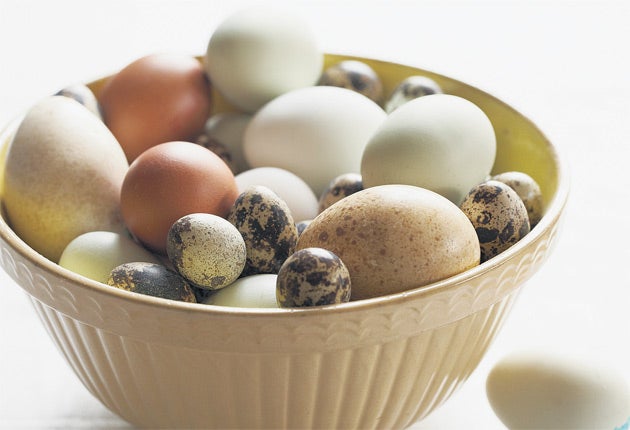Eggs - Time to get cracking
Now that we can all get our hands on delicious rare-breed and specialist eggs, let’s think beyond the breakfast table, says Anthea Gerrie

Foodies will be hoping for something a little more functional than a globe of gourmet chocolate by way of an Easter egg this year. Many are looking forward to a box of real eggs, which are as sensory a flavour experience as even the finest chocolate. We are not talking just any old eggs, mind you, but hen’s eggs with provenance.
Named for the farm from where your local keeper of rare breed chickensdispatches them to the village shop, if you’re a lucky country-dweller, or for the posh farm brands which now supply supermarkets. One of the best advances in British food is that every city dwellercannow enjoy a beautiful fresh farm egg with a rich, old-fashioned taste. Also catching on are the seasonal beauties that herald a late spring – and look gorgeous on the kitchen counter. These include pheasant eggs, whose olivegreen and brown shells could have beenhand-speckled by Farrow & Ball, palestbluebantam eggs, and quail eggs, whose coats of marbled coffee and cream are the most delicate aquamarine on the inside. Meanwhile, novelty- seekers are searching out rare turkey and gull eggs as well as goose eggs big enough to produce a family omelette. Not to mention gigantic ostrich eggs, whose only virtue, according to serious cooks, seems to be that they are a talking point. But it’s harder to find better taste – or value – than the egg from a properly raised chicken, a superfood at an unbeatable price compared to other protein sources. “Iwould far rather have a hen’s egg than any other kind,” says Rowley Leigh, who was among the first to experiment with ostrich eggs when they first came to market. “Now the asparagus season is upon us, it’s pretty hard to beat a lovely fresh softboiled hen’s egg with asparagus soldiers – the two ingredients are made for each other.” Andwe are all slowly coming back to thenotion put into our heads half a century ago by the British Egg Marketing Board, who urged us to go to work on an egg.
Falsely discredited by Edwina Currie as being harbourers of salmonella, they were, equally wrongly, thought to be dangerous to eat in quantity because of their cholesterol content. It’s beenproven that the dietary cholesterol in eggs does not have a significant effect on blood cholesterol and the British Heart Foundation and Food Standards Agency have now lifted their limits on recommended consumption. A study published last year in the Nutrition & Food Science journal revealed that eggs are one of the most nutrient-dense foods money can buy andwe should be aiming for one a day. Aswell as their high protein content, eggs are a rich source of vitamin A, D, B, iron and folic acid and also contain anti-oxidants which can help prevent degenerative blindness. No wonder Brits,who eat two or three a week on average, have pushed consumption up to 11 billion eggs per year. Clarence Court, which has enjoyed astonishing success since it first decided to sell upmarket eggs from rarebreed birds more than 20 years ago, is partly responsible for a new surge in egg consumption (up more than 5 per cent in the last quarter of 2010 alone).
The brand enjoyed a sales increase of 15percent last year in Selfridges, where leading columnist and chef Mark Hix, who operates a champagne bar in the store, is a massive fan: “I only use Clarence Court eggs because of their rare breeds and real flavours – they have the deepest amber yolks,” he says. Jamie Oliver and Rick Stein are also declared fans so what on earth can make a branded egg special enough to get chefs waxing lyrical?“ Clarence Court hens are athletic birds which walk up to a mile a day,” explains head farmer, Richard Kempsey. “They utilise their time and energy to the full, which results in the rich yolks and flavour.” They can be had for £1.99 a half-dozen, a relatively small increase on the price ofacommon or garden free-range egg. Buteven the best branded egg is not unbeatable.
It’s possible Sussex has something over Cornwall, as Leigh swears by his supply from “Roger the egg man” in EastHoathly, while I find it impossible to imagine a better specimen than those frommy own local supplier, Edwina Le May of Ladymeads Farm in CousleyWood. They come in odd shapes and sizes, cost an eye-watering £3.10 for six, and you never know if you will find any at the shop, as the hens lay sporadically and shipments fly out of the door within a day of arrival. As Max Clark of Leiths Cooking School, also an aficionado of fine eggs, says: “It’s better to have less of a beautiful egg whose rich yolk shows it has had a good diet than more of an inferior farmed one. The finest are a feast for the senses.”
Subscribe to Independent Premium to bookmark this article
Want to bookmark your favourite articles and stories to read or reference later? Start your Independent Premium subscription today.

Join our commenting forum
Join thought-provoking conversations, follow other Independent readers and see their replies